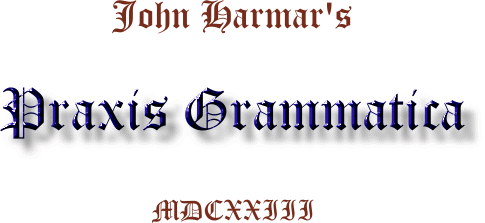

Full text available at Amazon and Barnes & Noble.

Verum et Genuinum Declinationum et Conjugationum usum liquido indicans,
ad solidam et expeditam Etymologiae Grammaticae cognitionem assequendam concinnata.
Cui tum Sententiarum, tum Facetiarum selectiorum cumulus accessit.
In usum Schol. Magdal. Oxon.
Maxima pendent ex minimis.
Londini
Excudebat Iohan. Havilan
impensis Tho. Pavier
M.DC.XXIII.
Lectori benevolo.
Ego tecum (amice Lector) plane sentio. Probe conjectas. Prosus indigna sunt haec leviuscula quae in lucem emittantur (de Praxi hac tantum loquor). Ita certe se res habet, nec inficias eo, si materiam spectes. Sin vero finem perpendas, aliter existimes. Praxis ista, de qua superius, ad captum, in usum, puerorum adhuc balbutientium attemperata est potissimum, qui e grammaticis cunis primulum erepserunt. Quibus utique hanc non minus utilem et commodam quam accomodam futuram arbitror. Huic, uti vides, Sententias quasdam elegantiores argutioresque cum delectu perquisitas, in quibus inest haud inculta oratio, consulto adjeci. Quinimo, Sententiis hisce apophthegmata aliquammulta ex Macrobio, Plutarcho, necnon ex amplissimo illo Des. Eras: penu deprompta, qua festiva, qua seria adjunxi, quae molestias istas praeceptoribus obrepere solitas subinde leniant, atque condiant. Quin cesso: ne longiorem justo praefationem minutiis hisce, ac teretismasi praefixisse videar. Vale.
Tuus, J.H.
Showing the true and authentic use of declensions and conjugations,
nicely organized for solid and rapid acquisition of a knowledge of the essential grammatical components of meaning.
There are also attached a substantial number of both famous sayings and rather well-chosen witticisms.
For the use of the students of Magdalene at Oxford
The very greatest depends upon the very smallest.
London
Printed by John Havilan
with funding from Thomas Pavier
1623
I am entirely in agreement with you, my reader-friend. You have come to the correct conclusion. These trifles that are coming out are quite unworthy (I am only speaking about this Praxis). Yes, that is the way it is. And you wouldn't deny it if you take a look at the contents. But if you consider their goal, you would think differently. The Praxis I have spoken about is especially fashioned for the use of children who are still stammering, ones who have crept from their grammatical cribs for the first time. Certainly I think that for them it is going to be not only useful and handy, but also well-suited. As you see, I have decided to add to it certain rather elegant and witty sayings carefully researched and culled. In this material you will find quite a refined kind of speech. But even more, I have added to these sayings quite a good number of apophthegms from Macrobius, Plutarch, and also from that hugely prolific Desiderius Erasmus, both funny and serious items fetched out from their store. These should from time to time make palatable and interesting those bothersome chores that tend to creep in on teachers. But no, let me stop so that I don't seem to have made a preface longer than it ought to be for these piddling items and to have attached it to the front of mere prattle. Farewell.
Yours, J.H.
Full text available at Amazon and Barnes & Noble.
© 2002-2006 adaptation, translation, and web-presentation by Claude Pavur, Saint Louis University. This material is being made freely available for non-commercial academic use. A facsimile of this text is available in English Linguistics: 1500-1800 (A Collection of Facsimile Reprints), selected and edited by R. C. Alston. No. 198. Menston, England: The Scolar Press Limited, 1969.